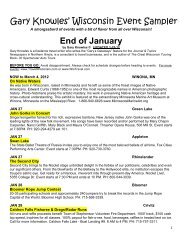2009 Annual Report - Wisconsin Public Radio
2009 Annual Report - Wisconsin Public Radio
2009 Annual Report - Wisconsin Public Radio
You also want an ePaper? Increase the reach of your titles
YUMPU automatically turns print PDFs into web optimized ePapers that Google loves.
The reason I enjoy working at <strong>Wisconsin</strong> <strong>Public</strong> <strong>Radio</strong> so much is that we<br />
are unique in the nation’s public radio system. Through our affiliation<br />
with the University of <strong>Wisconsin</strong> Extension and the Educational<br />
Communications Board, lifelong learning is central to our mission. Since<br />
our inception, and beginning with the <strong>Wisconsin</strong> School of the Air, we<br />
have endeavored to embrace the principles of the <strong>Wisconsin</strong> Idea, which<br />
include extending the boundaries of the university to the boundaries of the<br />
state and beyond.<br />
Although there are a couple of other state networks in this country, what<br />
sets us apart from the rest is our system of seven regional bureaus<br />
throughout the state. These bureaus serve to maintain a local presence not<br />
Phil Corriveau<br />
just in Madison, but also in Milwaukee, Green Bay, Wausau, Eau Claire,<br />
La Crosse, and Superior. Each bureau is managed by a regional manager and a staff of reporters,<br />
promotions and outreach personnel, and dedicated volunteers. We also have a statewide<br />
<strong>Wisconsin</strong> <strong>Public</strong> <strong>Radio</strong> Association support group, which works to help raise funds and<br />
awareness of the stations in their communities.<br />
What sets us apart in the United States from other countries is primarily the diversity of funding<br />
sources which support us. In the U.S., unlike some other countries, the public broadcasting<br />
system was put in place after commercial radio was already established. That meant that there<br />
was already a non-government funded business model in place, and government funding came<br />
later.<br />
<strong>Public</strong> radio receives funding from a wide variety of sources, including universities and colleges,<br />
states, federal funding through the Corporation for <strong>Public</strong> Broadcasting, business and corporate<br />
support, grants, and, most importantly, listener support. The weakness of having such a complex<br />
budget made up of many funding sources is also a strength, because if any one source of funding<br />
diminishes, the whole enterprise won’t fall apart.<br />
Individual listener support makes up the largest percentage of our budget, which is as it should<br />
be, in my opinion. Listeners who are willing to pay for the quality of our programming are our<br />
most stable and reliable funding source, and after all, the reason for our existence is that listeners<br />
feel passionately enough about our programming that they are willing to voluntarily fund it.<br />
Phil Corriveau<br />
Director<br />
From the Director<br />
3




